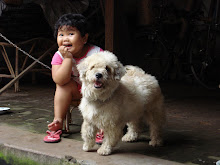Observing my daughter , Sekar Putri, learning to communicate is amazing. She is now 2 year 10 m0nths old. She produced her first word "kakak" when she was turning one. I noticed that she imitated our habit of greeting our next door neighbour's daughters, Kakak Tiara and Kakak Echa, everytime we met them. Since then she started to call them Kakak. The next word is "Dede" since those two kakak called Sekar "Dede".
Having been exposed with Indonesian, Javanese and a little English, Sekar is able to communicate well now. She can express her feelings using appropriate words. She sometimes says "thank you" "makasih" or "matur nuwun" when given something. I usually make up a story from certain pictures that she likes. She keeps on asking me to repeat the story. I was surprised when one day she showed me the pictures and told me a story with her own words. She didn't change the name of the characters but she made up her own story which was different from mine. Knowing this, I am more interested to know how a child acquires a language.
Echa, Dardjowidjojo's book, has given much information about this. His research reveals that children's language development is influenced by their innate properties and environmental stimulation. Children can not be forced to produce sounds or words when their brain is not ready. According to Chomsky, children's language acquisition occurs when provided with appropriate nutrition and enviromental stimulation. I know now why Sekar can't produce the sound [r] yet. According to Jakobson , this sound is usually acquired the latest. Sekar's organ of speech is not ready to produce [r] at this moment.
I conclude that stimulation is important to help children learn a language. However, we don't have to force them to speak the language when their organ of speech and brain are not ready.
Tuesday, October 16, 2007
My daughter's language development
Posted by TEFL TERE at 9:23 PM 0 comments
Subscribe to:
Posts (Atom)
